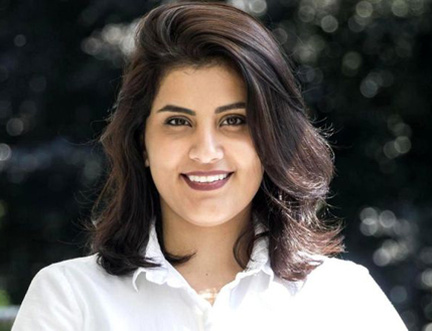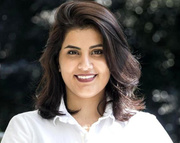Kidnapped Freedoms
By Loujain Alhathloul

In 2018, we commissioned 51 authors from 25 countries to write essays exploring ideas about freedom for The Freedom Papers, a publication produced in partnership with Gutter Magazine. Five of these essays, including the one featured below, were commissioned by young programmers aged 8-14 who were working with us as part of the Year of Young People 2018. Read on for Loujain Alhathloul's essay, and visit guttermag.co.uk to purchase a copy of The Freedom Papers.
The journey started on 30 November 2014, stubbornly parked in front of the Saudi land borders for 26 hours, in an endeavour to transform the status of Saudi Arabia’s women by the act of driving. It was time to burst our little bubble and confront the injustices experienced by women.
In a car driven by a man accompanied by his wife and me, we arrived after three and a half hours to a strange and dark place. It was only a day later that I was informed of my location: a juvenile centre, as Saudi women under 30 are considered teenagers.
Confused and isolated in my solitary confinement, I drowned in a pool of constructed scenarios about my own destiny. ‘L’enfer c’est les autres’. How much I disagreed with the author’s conclusion. Days of isolation burned me alive. My suffering was put partially at rest when I was transferred to a common room.
On the fourth day, I was finally visited by my husband who looked more confused than myself. A week later, my father brought a bag full of my French literature degree books. La Nausee by Sartre was one of my prison companions. Who other than him would I have picked? His novel La Nausee resonated with my reality, or with my distorted perception of my present. I am not sure if it was the right choice of reading in my situation. However, after experiencing such unfairness, I started seeing Sartre’s distorted reality. He was as trapped as me.
In 2013, when I first started my physical activism, it was my father who was summoned and punished for my actions. I felt insulted and furious towards such a decision, which sent a clear message: you, women, don’t exist.
When it was my turn to wash my clothes, I was for the first time exposed to the other prisoners. Stepping into the common area, 12 pairs of eyes were staring at me. Mixed feelings of fear and pity immersed my body. For a moment, I thought I had been thrown back in time, looking at the infamous mugshots of Montreal’s 1940s prostitutes. I wasn’t far off, as many of these women were in one way or another prostitutes forced into this business by the mercilessness of poverty. The Saudi justice system treats their cases as ‘adultery:’ one year and a hundred lashes to those unmarried women performing sexual relationships with men, and a harsher sentence to those unfortunate married women.
Disrespected by the system in general, these women are hardly experiencing a fair procedure. Sarah waited for an entire year for her first hearing. On that day, she was supposed to be released as her crime only required one year of imprisonment. Women like Sarah lost their freedom to control their bodies and to provide for themselves on their own terms from an early age. Above all, they lost their right to dignity.
After my first month living with these incredible women, I realised that many of them were trapped in an unforgivable mental state. For some, it locked them in a swirl of fear and desperation, whilst for others, it set them free – free to imagine and construct their own ‘dimension’, contradicting facts they decided to repress deep in their subconscious. Nourah was an extreme case of this. Eager to see her family on a weekly basis, she would come back from their visits in tears, having not seen her closest sister, Fatima. Fatima had actually been six feet underground ever since Nourah’s brutal attack against her.
On a dusty, temperate day, the guards accompanied us to our daily open area time. It had been two months since my arrest. A fellow inmate, hesitant and embarrassed, revealed that she was incapable of using a smartphone as she had been in jail long before their popularity and affordability. She knew a different time. A smartphone was a mystery to her. It was only then that I realized how the lack of freedom could affect someone’s belonging to the modern world.
At dawn, the usual loud knock of a key on the outside metal bars. ‘Prayer time, girls!’ was announced with a heavy eastern accent by one of the guards, who later observed us practising what should have been a private act of faith. It was a moment of realisation; I had lost everything, even my free and pure relationship with god.
My free spirit, however, had not been affected as they were incapable of reaching it. I preserved this ancient powerful survival instinct and lived, even survived, through more arrests and summons.
8:00pm – The usual steps approached in rhythm with a large ring full of little keys rattling into each other. ‘Click, click.’ The door was doubly locked, then... suffocation. It was absurd, but every time the guard locked my room I felt anxious, even though the end of the hallway was also locked by bars and the prison had three other doors to keep us inside this little space on earth. It was an irrational reaction; how could a simple lock among four others make me endure such great pain?
Going back into my memory of feeling, I saw that this peculiar lock was the last bit of power and control I had over myself, my life, my freedom.
It has been three years since my release and yet, the question of freedom still haunts me. Am I truly free today?
I have since undergone more arrests and multiple summons. I constantly fear for my safety but also for all the women of Saudi Arabia. Above all we, as citizens of Saudi Arabia, are being challenged in our patriotism, as we are forced to hold narratives and political positions in line with the official one. Others sell their ‘pen’ in order to buy their freedom and peace, prostituting their talents. The latter is not far from Balzac’s denouncement of intellectual prostitution practised in journalism.
*
Considering all these elements, how can I, as an individual, define freedom?
Freedom is safety: safety to express, to feel protected, to live and to love.
Freedom is peace: peace to reveal the purest and most sincere humanity implanted deep within our souls and minds without experiencing unforgivable consequences.
Deprived of safety and peace, I have lost my freedom. Forever?
Copyright © 2018, Loujain Alhathloul. All rights reserved.
Supported by the Scottish Government’s Edinburgh Festivals Expo Fund through Creative Scotland.
Look, Listen & Read
- 2026 Festival:
- 15-30 August
Latest News
 Major new partnership with Celtic Connections
Major new partnership with Celtic Connections




